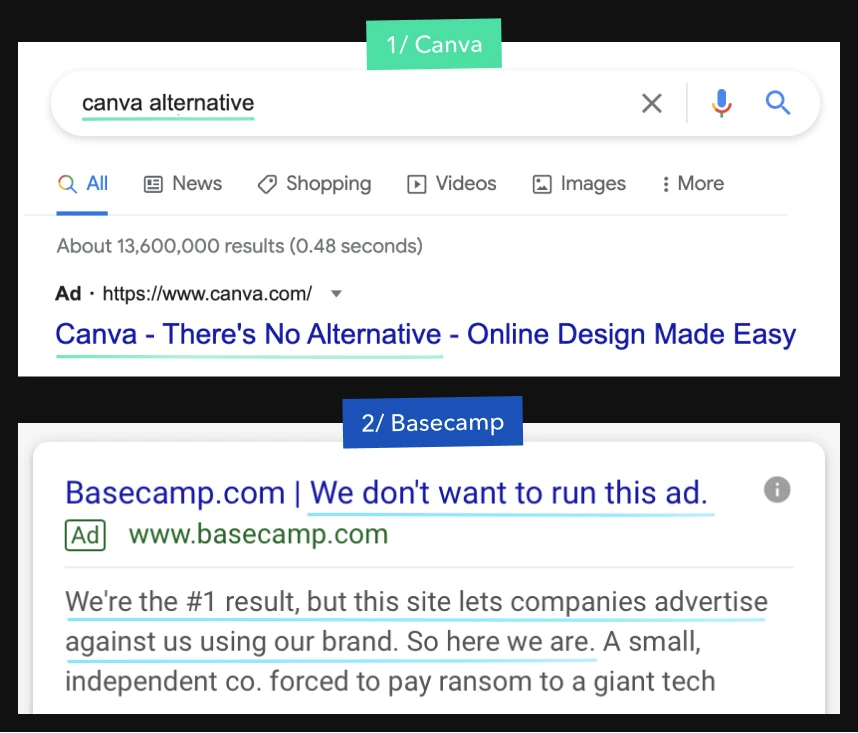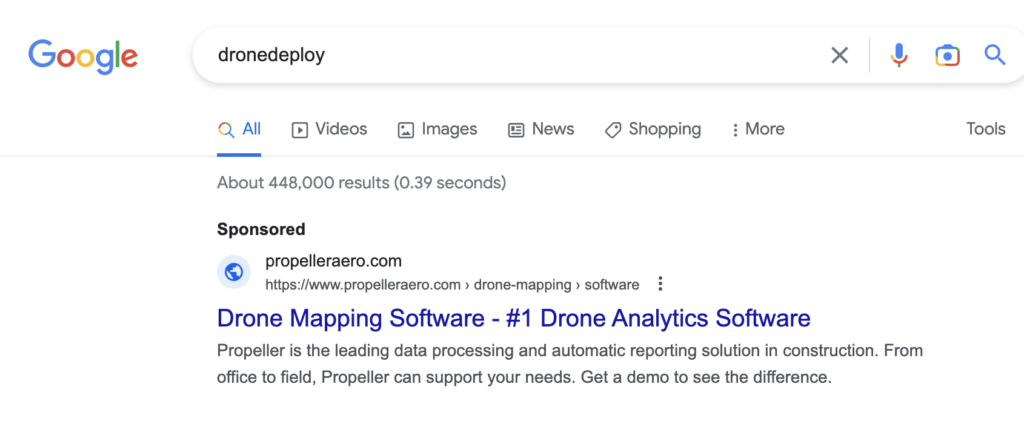This article was written in reference to recent activity on LinkedIn and Twitter debating the ethics of competitor marketing.
In the current landscape, “unethical” is a very loaded word.
You might hear it in reference to open-pit mining, selling data, and misinforming voting populations.
But competitor marketing? ‘Unethical’ might be a bit of a stretch.
A decade ago, competitor marketing (CM) was called comparative advertising. And it was going on long before that.
90s kids will remember (and still have an unshakeable political position on) Pepsi v Coke, Apple v Microsoft, Nike v Adidas, McDonalds v Burger King.
It was (and think still is) funny to overreact when wait staff asked if Pepsi was okay (“is Monopoly money okay?!”). It was sport. And most importantly (and proven by the fact both brands are both still around and both worth billions) it didn’t hurt anyone.
This town (the town being the global FMCG market) has always been big enough for the both of them.
In SaaS-land, it’s also now standard operating procedure. Search for “Culture Amp” and you’ll get ads for competitors Bob, Empuls and Crewmojo, complete with dedicated landing pages designed to convert you, and feature/benefit analysis tables to boot.
The simple fact of the matter is: competitors have your potential customers. And you shouldn’t ignore that.
So should CM be part of your customer acquisition strategy? Let’s have some good faith debate about the morals behind the marketing.
The downsides
CM is far from a cheat sheet.
It’s all about intent: if a paid-up Jira user is navigating to Jira via Google search to begin their work day, you’ve wasted your ad dollars. But if someone’s typing it in to shop around agile project management tools, you popping up might just swing their vote.
Next, for every customer who finds it amusing, there’s one who doesn’t like the whole “competitive” vibe.
In consumer markets, it can boost your equity or leave a bad taste. It comes down to understanding your target audience, and giving them a reason to care about your beef (whether than reason is amusement or evangelism).
But in the compete-or-die startupsphere, it’s a slightly odd take given the nature of the beast.
You can compete, but you can do it respectfully. Being clever, being tongue-in-cheeky, but ultimately owning the move.
Another downside can be the potential for confusion. Actively impersonating a brand is obviously bad (and illegal, and pointless).
Again, don’t pretend you’re not doing what you’re doing.
Usually, competitor marketing makes a clear differentiation between themselves and their comparison of choice (with the obvious aim of highlighting that they’re the better choice).
The upsides
CM is everywhere in SaaS and tech so there’s gotta be a few perks. But to be valid, those perks have to work for businesses and customers.
And founders.
Let’s look at CM in the VC space. First-time founders are clearly highly intelligent, but they can be vulnerable. Often fearfully protective of their idea, unsure what the next step is or what the best funding route is, and strapped for cash.
Every VC after their product is selling their own product. Like customers, founders are empowered by choice.
The style of some more aggressive firms is to give the hard sell (which is fine). The style of others is to push for major equity portions and give little support in return.
This is where comparison comes in.
VC seems like a big, scary, faceless machine until you start to meet and greet the actual faces. Each firm is different – in size, niche, personality, etc – but some are comparable. And it might just be that by referring to a competitor in your advertising materials, you give a founder a useful frame of reference.
Obviously, VC isn’t an off-the-shelf product. It’s not something you can get a 30-day trial for.
Choosing who you want to invest in your company is a huge decision in the life of any founder, and a solitary Google Ad shouldn’t sway your due diligence one way or the other… But it’s useful to know who the competition is.
Some VCs (even highly qualified and respected ones) go as far as to tell young founders: “don’t worry about the competition – focus on you”.
But is it so black and white?
You should focus on you and your customers, but you also need to be hyper-aware of what your competitors are doing – especially in red and pink oceans, and especially when considering your go-to-market strategy.
The reality
The debate becomes more relevant in the time of data crackdown and soaring PPC costs.
But competitor marketing is everywhere, and has been for a while. Like it or not, if it’s working for SaaS startups, it’s not going anywhere.
If your brand name has been bid on by a competitor, your best course of action is to be flattered by the imitation, raise their costs by bidding on your own name, and raise it with Google if you think they’ve infringed on your trademark.
It’s what Basecamp and Canva do brilliantly:

You should be the one taking up your brand’s own real estate. It’s not personal – it’s now a pretty standard cost of doing business on the www.
In a time of immensely oversaturated search engines, deepfakes, and ChatGPT – a bit of friendly fire in the pay-per-click space is the last thing companies should be worried about.
Let’s remember also that every ad tries to take business from the competition.
CM doesn’t need to be a gunning-for-all guerilla approach. And no one’s forcing anyone’s hand.
Challenger brands pay for some impressions alongside a competitor, give the customer a choice, and capture a portion of their traffic.
Like products on a supermarket shelf, a customer might go in intending to buy one, but the packaging next to it is shinier. And that’s ok.

The verdict
On the question of whether competitor marketing is effective, the answer is a “yes, if done well”. To the tune of a 15% lower CAC.
There are some cases where it’s probably best not to.
The not-for-profit sector has (rightly) banded together to form an anti-competitor bidding alliance.
But most of the time, capitalism will prevail… and competitors are fair game. The caveat is to always be kind, to be cheeky – not dishonest, and not disrespectful.
CM is also not a cheap win.
If it were that easy to click your fingers (or trackpad) and poach customers, it would be very easy for the internet to get muddied with disingenuous offers and bloody competition – in which case the only loser is the consumer.
Whatever your stance and whichever horse you back, it’s impossible to ride on a competitor’s coattails.
The real work goes into having something worth clicking on.
Who wins?
Well, in terms of revenue, big tech wins. Always.
Decent data is hard to come by, but some sources point to the fact that 40-50% of all VC funding goes to the big ad platforms. Not a drop in the ocean by any means.
But big tech also does what it exists to do: help us communicate our message.
Friendly debate is important, as is the freedom that comes with a free market. If you’re still undecided, go with what you feel is right for your company, and what competition/collaboration means to you.
If you ask me though, there’s nothing to get upset about.
This town is big enough for all of us, mate.











